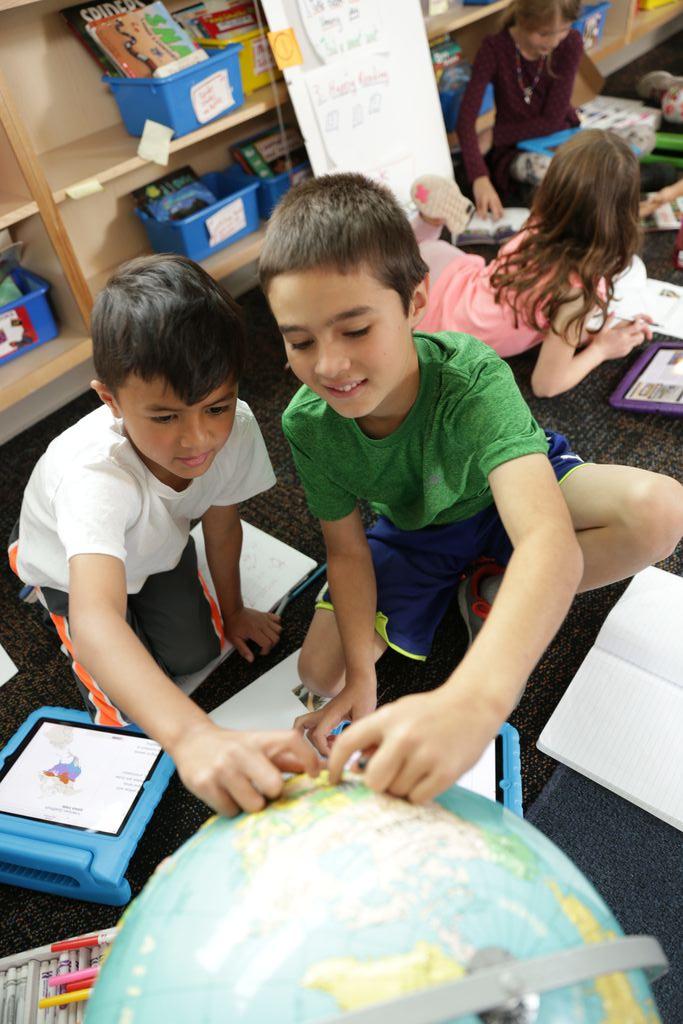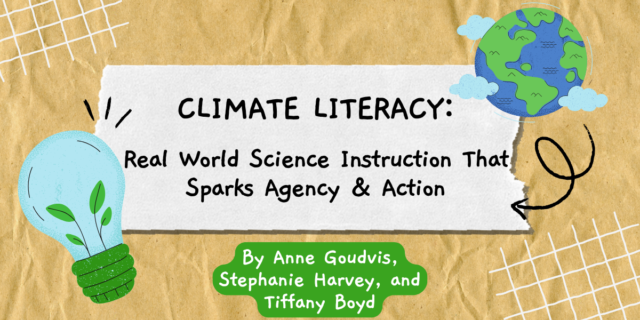
By authors of Inquiry Illuminated and Comprehension Toolkit, Anne Goudvis and Stephanie Harvey.
Note: This is the first part of the “Researcher’s Workshop” blog series. See part two here and part three here.
***
Squeals of delight and wonder erupt amongst the second graders gathered on the rug. What’s going on? These budding scientists are watching a live webcam from the Cornell University Lab of Ornithology. A large owl is sitting on its eggs in its nest and as the owl moves to the side, it appears that an egg is hatching before the kids’ very eyes! Questions burst forth: “Will all of the owl’s eggs hatch? How does the owl guard its babies once they hatch? Does it hurt the babies when it sits on them?” Kids write and draw their observations and jot their questions in a scientist’s notebook. It’s all part of the class inquiry on bird adaptations, behaviors, and habitats, related to second grade state and district science standards on animal adaptations and habitats. But rather than reading a science textbook, or just watching animal videos, kids are thinking about and responding to essential questions that frame the class inquiry: How do animals adapt to and survive in their habitats? What behaviors ensure their survival? What happens when an animal’s habitat and survival are threatened? Below we share instructional strategies for research and inquiry-based learning.
Researcher’s Workshop in Language Arts, Science, and Social Studies
We advocate teaching language arts, science, and social studies in what we call researcher’s workshop. Just as with reader's and writer's workshops, researcher's workshop is carefully structured and includes explicit instruction in research strategies and the inquiry process. Whether it’s observing nesting birds, or any other topic for that matter, researcher’s workshop gives kids the time and space to read, write, talk, draw, listen, view, create and investigate. Stimulating environments fuel kids’ natural curiosity. Teachers who create classrooms like this instill a disposition to explore, investigate, read on, and learn more.
Comprehension at the Core: Kids Build Knowledge and Understanding
We’ve advocated for teaching comprehension strategies as tools for kids to build content knowledge for years. Rather than simply skimming the surface of curricular topics, they should be delving into information and constructing ideas for themselves across all content areas, 24-7. Researcher’s workshop is a knowledge-building activity and comprehension instruction is at its core. In content-rich, inquiry-based classrooms, kids are asking questions, inferring, discussing, synthesizing information, and generating new ideas. Comprehension and thinking strategies such as these ensure that kids learn and understand more deeply, engage more completely, and add to their store of knowledge over time. But as Art Costa (2008) says, the acquisition of knowledge is only the beginning. “The deeper [the] knowledge one has, the more analytical, experimental, and creative one’s thought processes.” Acquiring knowledge is a powerful jumping-off point, but kids get truly engaged when they have a chance to spend time exploring significant issues and ideas and actively use their knowledge. Costa suggests, “[it’s] all about what kids do with their new knowledge—how they make sense of it and use it in their daily lives.”

One thing we know is that kids don’t build lasting knowledge and understanding simply by amassing facts in information-laden curriculums. We teach the term thinking-intensive reading, listening, and/or viewing even to our youngest students, so they learn right from the start that reading is, above all, about thinking. And not just thinking per se, but asking questions, drawing conclusions from text evidence, inferring from visual and text features, and surfacing themes and important ideas.
What’s key is that actively using their knowledge and going deeper into the essential questions and bigger ideas gives kids a much better shot at “enduring understandings” and learning that lasts (Wiggins and McTighe 2005). The bottom line is this: the more content knowledge we have, the more likely we are to grow it. So we are more committed than ever to merging comprehension and content instruction in researcher’s workshop.
A Framework for Inquiry

When we first engage in inquiry learning, there is a lot for kids to learn how to do. We teachers demonstrate the entire process as we go through the inquiry as a class. We flood the room with resources. We model how we ask questions. We come up with a researchable question and as a group investigate it together. We show kids ways to synthesize learning and take it public. But the goal is to teach kids the process, so they begin to internalize it and become increasingly able to research on their own.
As with every inquiry, we attend to both content—the topic and discipline under study—and the process—the recursive steps we go through to teach the research process.
We design enduring understandings and essential questions that set the direction of the inquiry. To build intrigue in the topic, we choose diverse resources that:
- build kids’ excitement and curiosity about the topic
- are accessible to all kids and responsive to their varying experiences and background knowledge
- represent a variety of media, appealing to different learning styles
- inspire deep dives into content spinoffs.
We explicitly teach a variety of lessons in each part of the inquiry framework: Immerse, Investigate, Coalesce, and Take Public. When we introduce researcher’s workshop, we first go through the inquiry process as a class, modeling each of the launching practices and lessons. As kids become more familiar with the process, we gradually release them to work more independently, guiding as needed. We find kids are really motivated to choose topics that intrigue them, gather resources, ask questions and have at it!
Renowned inquiry researcher Kath Murdoch reminds us that inquiry teachers and learners are “driven by the desire to…make meaning of the ever-changing knowledge landscape of which we are a part. This includes acquiring knowledge, but it is understanding that is the ultimate quest.” (Murdoch 2015)
***
Listen to them on the Heinemann podcast discuss a structure for inquiry that's predictable, proven, and—most importantly—authentic.

Steph Harvey and Anne Goudvis are the coauthors of Strategies That Work, Inquiry Illuminated, The Comprehension Toolkit Series and Short Nonfiction for American History. Teachers first and foremost, they work in classrooms side by side with kids supporting teachers in progressive literacy practices.




